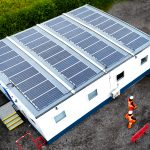Sector - Software & Technology
Space-based solar power prepares for lift-off

The UK’s space-based solar power industry is preparing for lift off thanks to a multi-million government investment to develop the cutting-edge technology.
In a speech at London Tech Week, Energy Security Secretary Grant Shapps revealed a £4.3M funding boost for leading UK universities and technology companies to drive forward innovation in the sector. Spaced-based solar power collects energy from the Sun using panels on satellites and beaming it safely back to earth with wireless technology.
An independent study in 2021, found that space-based solar power could generate up to 10GW of electricity a year, a quarter of the UK’s power needs, by 2050. It could create a multi-billion pound industry, with 143,000 jobs across the country.
Secretary of State for Energy Security and Net Zero Grant Shapps said: “I want the UK to boldly where no country has gone before – boosting our energy security by getting our power directly from space.
“We’re taking a giant leap by backing the development of this exciting technology and putting the UK at the forefront of this rapidly emerging industry as it prepares for launch.
“By winning this new space race, we can transform the way we power our nation and provide cheaper, cleaner and more secure energy for generations to come.”
The eight projects to be awarded funding from the government’s Space Based Solar Power Innovation Competition, part of the flagship £1 billion Net Zero Innovation Portfolio, include:
- the University of Cambridge is receiving over £770,000 to develop ultra-lightweight solar panels that can survive long periods in high-radiation environments like the conditions in space. This will help increase the lifetime of these satellites, improve energy yields and lower the cost per unit of energy
- Queen Mary University in London will receive over £960,000 to develop a wireless power transmission system with high efficiency over a long range, to support the technology to beam solar power from the satellites back to Earth
- MicroLink Devices UK Ltd in Port Talbot, South Wales, has been awarded over £449,000 to develop the next generation of lightweight, flexible solar panels, which could be used for solar satellites
- the University of Bristol is receiving over £353,000 to produce a simulation of solar space wireless power transfer capability to explore the possibilities of this technology, and provide further evidence on the performance, safety, and reliability of space based solar
- Satellite Applications Catapult Ltd in Didcot has been awarded over £999,000 for an experiment to test the electronical steering and beam quality of its space satellite antenna technology. The company are receiving over £424,000 for another project to study how to advance commercial space-based solar power that can provide a reliable source of electricity for the UK
- Imperial College London is receiving over £295,000 for a study to assess the key benefits and impacts of space solar, including how solar energy from space could be integrated into the electricity grid alongside other low-carbon energy sources
- EDF Energy R&D UK Centre Ltd will receive over £25,000 for a study to improve knowledge of the value of introducing space based solar power into the UK’s grid
Dr Mamatha Maheshwarappa, Payload Systems Lead at the UK Space Agency, said: “Space technology and solar energy have a long history – the need to power satellites was a key driver in increasing the efficiency of solar panels which generate electricity for homes and businesses today.
“There is significant potential for the space and energy sectors to work together to support the development of space-based solar power, and the UK Space Agency has contributed £1M to these innovative projects to help take this revolutionary concept to the next level.”
If you would like to read more stories like this, then please click here
Related Articles
More Software & Technology News
- New laws will strengthen cyber defences for essential public services
4 Dec 25
UK government has introduced the Cyber Security and Resilience Bill to Parliament.
- £115M lost to cyberattacks
28 Nov 25
Small construction firms lose over £115 million to cyberattacks annually, making it the UK’s third-most
- COWI partners with University of Strathclyde to trial environmental DNA for sustainable infrastructure
18 Sep 25
COWI has partnered with the University of Strathclyde to trial the use of environmental DNA (eDNA)





